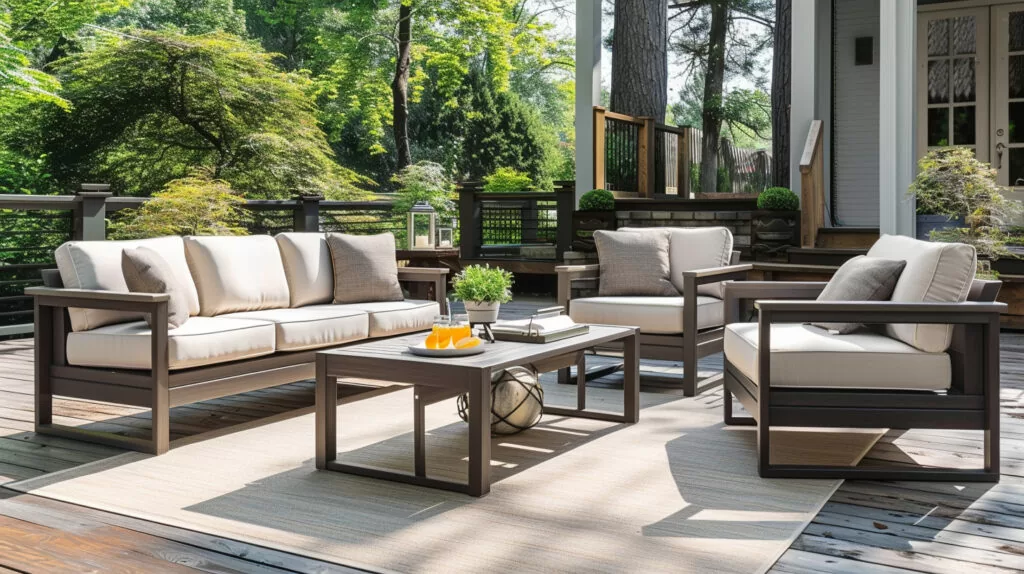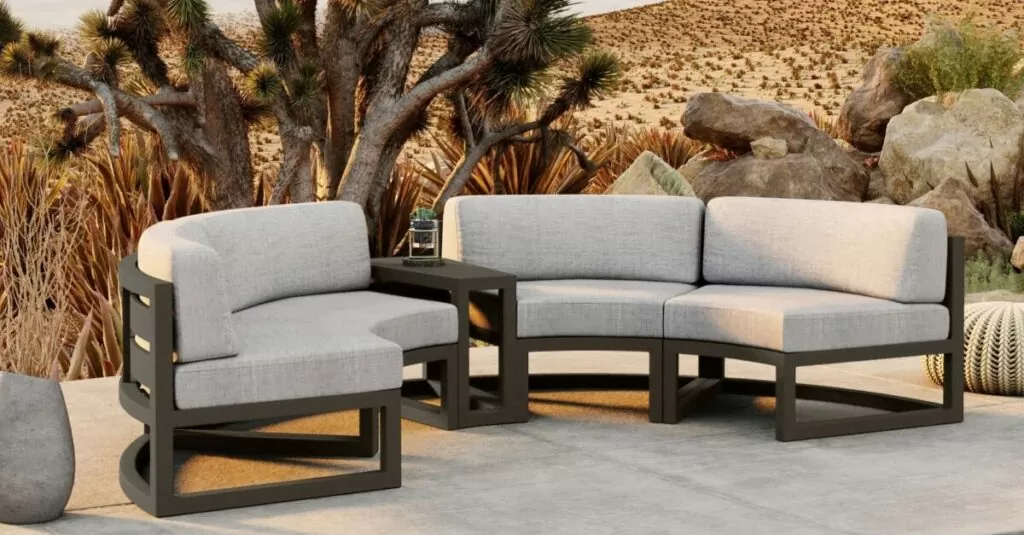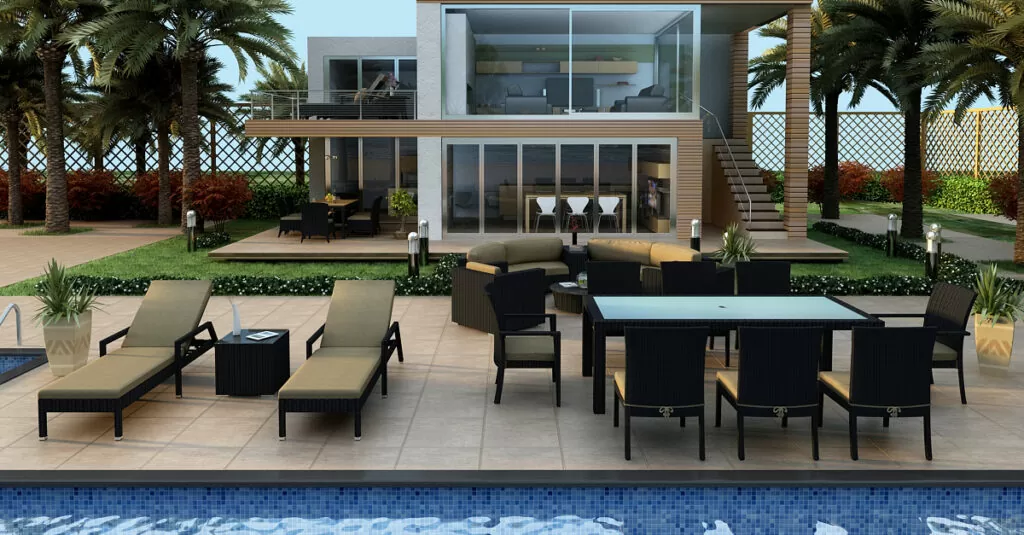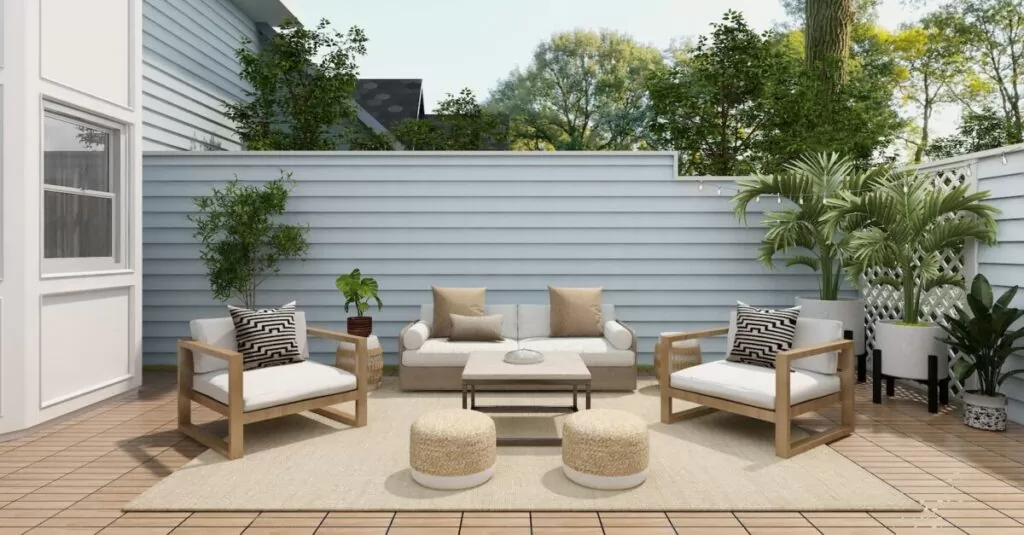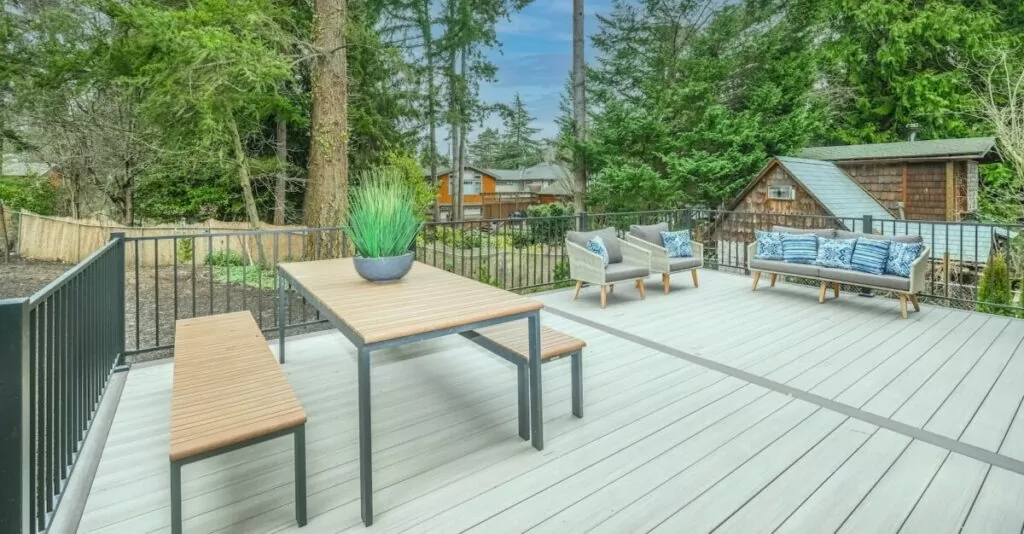Outdoor spaces are amazing for relaxation and fun times with friends and family. With the right patio furniture, you can create a comfortable oasis to enjoy beautiful weather. While there are many options on the market, composite outdoor furniture has emerged as a top choice for its durability, low maintenance, and style.
In this robust guide, we’ll explore everything you need to know about composite outdoor furniture. You’ll learn what sets it apart from traditional materials like wood or wicker, discover the different composite materials used, and get tips on choosing pieces that match your personal style. We’ll also cover proper cleaning methods, storage, and compare composites to other popular outdoor furniture materials.
By the end, you’ll be a composite furniture expert ready to create your dream outdoor living space! So let’s get started.
Patio Productions’s Key Points
- Composite outdoor furniture is made from a blend of recycled plastic and organic materials like wood pulp or rice husks for an eco-friendly option.
- It resists weather damage, fading, stains, rotting, cracks, mold, and mildew better than natural wood.
- Composites mimic the look of real wood but require no staining, sealing, or repainting for upkeep.
- There are many composite color and style options from modern to classic to match your personal taste.
- Proper maintenance is simple, involving occasional soap and water cleanings to keep furniture looking new.
What is Composite Outdoor Furniture?
Composite outdoor furniture refers to patio and deck furnishings constructed from a mixture of recycled plastics, synthetic fibers, and organic matter instead of 100% natural woods. Manufacturers blend recycled milk jugs, detergent bottles, bamboo dust, wood pulp, rice husks, or other plants and minerals using heat compression or injection molding to create weather-resistant furniture pieces.
The result is durable, stylish outdoor seating, tables, and accessories that incorporate sustainability and require little routine maintenance compared to traditional wicker, teak, or cedar wood options. Modern technological advances allow composites to realistically emulate the look and feel of natural materials using recycled alternatives.
Advantages of Composite Outdoor Furniture
- Extreme Weather Resistance – Composites withstand intense sun, snow, rain, and salt air through intense seasons year after year without significant damage or needing protective covers.
- Stain, Mold & Mildew Resistant – Food, drinks, bird droppings easily wipe off composite furniture without staining or discoloration over time. Anti-microbial properties prevent mold & mildew growth.
- No Upkeep – Unlike natural wood furnishings, composites never need staining, sealing, waterproofing, or repainting at any time to keep their good looks. An occasional soap and water cleaning is all that’s needed.
- Will Not Splinter or Crack – Heat and pressure fuse composite materials into a durable, dense polymer that resists splintering, cracks, fractures, splits, or dents better than wood.
- Fade Resistant Colors – UV-stabilizers are added to the polymers that reduce fading from sun exposure. Most composites retain over 96% of original vibrancy for at least 5 years.
- Eco-Friendly & Sustainable – Recycled plastic, plant fibers agricultural waste, and wood by-products make composites an environmentally responsible furniture choice for your outdoor living area. Production of virgin plastics and logging is reduced.
With all these advantages over traditional patio furniture building materials, it’s easy to see why composite selections are surging in popularity for outdoor living spaces. Your outdoor relaxation and entertaining furniture can now handle full exposure to weather extremes while retaining its beauty year after year with almost zero upkeep.

Types of Composite Materials Used
The specific composite blend can slightly alter the furniture’s properties and performance. But all mixes result in durable, stable outdoor furniture. Some of the most common ingredients used by quality manufacturers include:
Recycled Plastic (HDPE) – Milk jugs, detergent bottles, plastic packaging and bags get shredded and reformulated into a polymer that makes up 40-70% of many composites. The recycled plastic provides tensile strength, binds elements together, and resists moisture.
Wood Pulp/Flour – Ground leftover sawdust and wood shavings supplement the recycled plastic to improve feel and structuring. The wood content typically constitutes 20-50% of the composite.
- Rice Husks – The outer protective shells of rice grains offer a sustainable reinforcement alternative to wood pulp that enhances durability.
- Bamboo Fibers – Shredded sustainable bamboo scrap fibers may replace portions of the wood pulp for added strength and environmental friendliness.
- Inorganic Minerals – Some composites feature limited amounts of inorganic fillers like stone/clay to enhance molding capabilities.
Manufacturing methods and proprietary custom formulations result in unique composite brand identities even though many use similar core material elements. In the end, any quality composite mix yields exceptional, eco-friendly outdoor furniture.
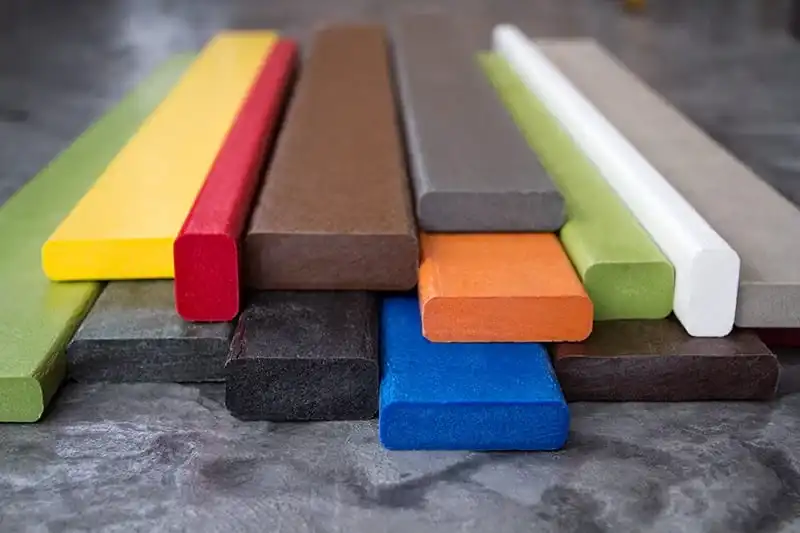
Choosing the Right Style & Design
A major benefit of composite outdoor furniture is the diverse range of styles and designs available to match anyone’s personal taste. Since composites easily mimic natural wood textures and grains, you’ll enjoy many of the same varied aesthetics as traditional materials. Whether your desired setting is casual or elegant, styles ranging classic to contemporary allow you to configure comfortable backyard spaces perfect for lounging, dining, or entertaining.
Casual Styles – Curved slat adirondack chairs, benches, and rockers promote laid-back relaxation. Varied recycled plastic or faux-wood chair, loveseat, and sofa selections work well around fire pits or porches.
Dining Sets – Available in round, square, rectangular, and oval shapes with smooth or textured tabletops. Matching slat, mesh, or solid constructed dining chairs. Ideal for snacking, meals, games, & visiting.
Chaise Lounges – Adjustable padded resin chairs function as comfortable recliners. Some have pull out side tables and wheels for maximum sun chasing convenience around the patio, poolside, or lawn.
Bar Height – Tall bar tables paired with stool seating promotes casual mingling and conversations in outdoor kitchens or entertainment spaces.
When choosing backyard furniture, select pieces that integrate nicely into your existing aesthetic. Measure your area’s dimensions and layout to allow proper seating, strolling, grilling, and activity spacing. Well-designed furniture arrangements improve backyard functionality and make the most of your outdoor square footage.

Maintenance & Care Tips
One of the most appealing benefits of composite outdoor furniture is the simple maintenance compared to natural wood pieces. Just an occasional soap and water cleaning to remove dirt, debris, bird droppings, and other messes keeps composites looking fresh. No staining, sealing, or painting is ever required to protect or refresh the material.
Here are important care guidelines to preserve your composite furniture’s beauty and performance for many years:
- Allow New Furniture to Acclimate – Let seats adjust to shaded placement outdoors over 2-3 weeks before intense sun exposure to minimize expansion issues.
- Wash Regularly – Every few weeks use a soft cloth/sponge, mild soap, and warm water to wipe away stuck-on grime, sap, pollen, and dust build-up. Let soap sit briefly before rinsing clean.
- Stand Up Cushions – Weekly turn/flip/fluff cushions to maintain shape and distribute wear evenly. Utilize cushion covers/storage bags when not in use.
- Winterize Properly – Relocate furniture to a covered area like a garage or invest in weatherproof furniture covers for snowy climates.
- Inspect Hardware – Check bolts/screws/fasteners yearly and tighten as needed to stabilize joints and prevent loosening issues over years of use.
Simple maintenance and regular cleaning will keep your composite furniture functioning and appearing like-new for 15 or more years. Follow those simple guidelines for effortless long-term maintenance.

Cleaning & Stain Removal Techniques
Quality composite furniture resists most challenging stains due to its non-porous surfaces enhanced with anti-microbial technologies. Spills and accidents can easily happen, but prompt cleaning can prevent permanent discoloration. Here are handy stain treatment procedures:
Everyday Messes – Food debris, grease drips, condensation rings, mud splatters, grass/pollen/tree sap residues come right off with warm soapy water, soft scrub brush, & some elbow grease on textured composite surfaces. Rinse thoroughly.
Mold & Mildew – Mix equal parts bleach and water for a spray bottle solution to eliminate occasional mold/mildew that surfaces. Lightly spray affected areas, let sit 5 minutes, scrub with a soft brush, rinse with clean water.
Tough Stains – Magic eraser sponges work well for red wine, coffee/tea, ketchup, and mustard by out the pigment. Avoid abrasive scouring pads to prevent dulling composite’s smooth sheen.
Extreme Discoloration – Very stubborn stains may need a 50/50 bleach/water soak for 1 hour followed by rinsing. Pretest in a small hidden spot first to ensure colorfastness before applying overall.
Don’t use acetone, nail polish remover, harsh chemical cleaners, scouring powders or anything too abrasive that could scratch, pit or scuff the composite furniture’s durable surfaces. A gentle approach preserves the quality appearance.

Durability & Weather Resistance
Outdoor patio furniture takes a real beating from intense sunlight, pounding rain, salt, sleet, snow, and extreme temperature shifts through all four seasons, every year. Traditional materials like wood, rattan, and wicker just can’t survive yearly exposure to the elements without degradation.
Composite outdoor furniture incorporates advanced technologies engineered to thrive outdoors regardless of environmental conditions.
- UV Protection – Anti-fade formulations and UV stabilizers are integrated during the manufacturing process to guard against color loss and material breakdown under intense ultraviolet radiation from the sun’s rays.
- Waterproofing – For wood furniture, moisture absorption leads to warping, swelling, and disintegration issues. Dense polymer construction prevents this absorption. Liquids easily wipe away instead of penetrating deep to wreak havoc over time.
- Cold Proof – Unlike natural fibers that become brittle in frigid winter temperatures, the dense polymers retain flexibility and avoid cracking when exposed to extreme cold.
- Rust-Free – Stainless steel and powder coated hardware keep bolts, screws, hinges safely corrosion free regardless of weather variations.
Detailed design engineering allows quality composite outdoor patio sets to survive over a decade through punishing seasonal environments – year-round. While no material lasts literally forever, composite is your best bet for investing in long term outdoor furniture that goes the distance.
Comparing Composites to Other Outdoor Furniture
Beyond traditional wicker, wood, and aluminum patio furniture options, discerning homeowners have a few other outdoor seating materials to consider, like aluminum, steel, and PVC, when shopping. Here’s how composite stacks up:
Real Wood Furniture – Natural wood furnishings require extensive yearly upkeep (staining, sealing, and prepping), but remain prone to splintering, rotting, mold, and mildew issues.
Wicker & Rattan – Affordable synthetic or natural wicker-styled furniture offers a classic, light style, but it fades, frays/splits and degrades faster vs. composites.
Aluminum – Lightweight aluminum withstands weather well but tends to dent, retain heat, and has an industrial appearance lacking wood’s warmth.
PVC Plastic – Polyvinyl chloride (PVC) plastic furniture offers budget-friendly durability but lacks aesthetics and eco-friendly appeal vs. composites.
No other outdoor furniture material blends sustainability, durability, beauty and low maintenance like premium composite furniture. It’s a superior option vs. traditional outdoor furniture options for 21st century lifestyles.

Environmentally Friendly Features
One of the most exciting benefits of composite outdoor furniture is its environmentally responsible profile. Manufacturers reclaim tons of post-consumer recycled plastic, wood scraps and agricultural by-products annually, reducing landfill waste and saving trees.
Here’s how composites help the planet:
- Production recycles used plastics and wood debris rather than utilizing virgin materials
- No deforestation occurs while harvesting sustainable bamboo fibers & agricultural leftovers
- Plastic packaging gets reformulated into eco-friendly outdoor furniture, instead of ending in a landfill
- Factory scrap & damaged pallets get reprocessed into durable furnishings
Everything from milk jugs and plastic goods packaging to construction site wood shavings find new purpose as all-weather patio furniture instead of clogging landfills. The renewable materials also require less energy to reformulate compared to virgin plastics or harvesting forests.
Investing in composite furniture allows you to furnish your outdoor living space stylishly while also protecting the environment through recycling. It’s a smart, sustainable choice that makes an attractive addition to any home.

Todd is a co-owner of Patio Productions and has worked extensively in the furniture industry since 2002, when he started a company that designed and manufactured bathroom vanities. He now has a hand in all online business operations, including keeping tabs on industry trends and making sure Patio Productions remains an innovative leader in the outdoor furniture space. He lives just outside of Denver, Colorado with his wife, two boys, and two dogs. They live on a lake where they can make the most of the outdoor lifestyle. His favorite patio furniture sets are his Harmonia Living sectionals.

